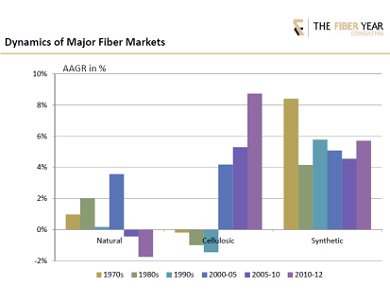The Industrial Association of Chemical Fibers (Industrievereinigung Chemiefaser e. V.) presents its annual report on the world fiber market. In 2012 the production and demand of man-made fibers (cellullosic and synthetic) reached another historic high, while the amount of natural fibers declined due to reduced production areas.
In 2012 the global demand for fibers approached 85.8 million tons. This is an increase of 4,5 % compared to 2011 and corresponds to a global per capita demand of 12.2 kg of textile materials for apparels, carpets, home and technical textiles. The output of man-made fibers holds about two-thirds of the world fiber market with an amount of 59 % for synthetic fibers and 6 % for cellulosic fibers. Natural fibers such as cotton account for the remaining 35 % and show a decline in production by 5 %, whereas the man-made fibers show dynamic growth – especially the cellulosic man-made fibers increased steeply with 10 % (see picture).
Expectations for the year 2013 are that the demand for synthetic and cellulosic man-made fibers will further increase. Growth drivers include factors such as a growing population, shorter fashion cycles and new product applications in the advancing industrialization in Asia and Latin America. At the same time the costs for cotton are expected to rise with positive effects on the man-made fiber sector and especially on the production of cellulosic fibers.
Dr. Heinz Meierkord, chairman of the Industrievereinigung Chemiefaser e. V., presented the impacts of the national and European energy policy and its effect on the competitiveness of the man-made fiber industry in Germany, Austria and Switzerland. The man-made fiber industry ranks among the energy-intensive sectors. Therefore state-imposed levies and taxes on energy prices have a severe impact on the competiveness of man-made fiber manufactures. The vote of the European Parliament against an intervention in the existing emissions trading system (ETS) was highly welcomed by the man-made fiber industry because it values that the fast reduction of CO2 emission in Europe is decisively driven by industrial innovations.
- Industrievereinigung Chemiefaser e. V., Frankfurt/Main, Germany




